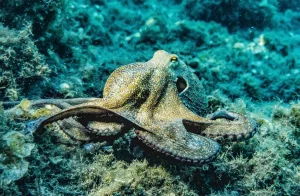From Shells to Octopuses
Mollusks are one of the most diverse groups of animals on the planet. They live in oceans, seas, rivers, and even on land. From the humble snail to the clever octopus, mollusks amaze with their diversity of forms, habits, and abilities. Although many of them lack the visual appeal of larger sea creatures, their role in ecosystems and unique adaptations are worthy of admiration.
Mollusks include such well-known orders as gastropods (snails and slugs), bivalves (mussels, oysters, scallops), and cephalopods (octopuses, squid, cuttlefish). Each of them has its own structural features and lifestyle. For example, bivalves filter water, purifying it from suspended matter and microorganisms, and cephalopods are considered some of the smartest invertebrates on Earth.
Octopuses are especially fascinating – creatures with incredible abilities for camouflage, problem solving, and even tool use. Their soft bodies allow them to squeeze into the smallest of cracks, and their skin can change color and texture in seconds. Octopuses can open cans, untangle knots, and even trick other animals – all without a single bone in their bodies.
But their more modest relatives, such as mussels and oysters, are no less interesting. They attach themselves to rocks and corals, creating entire colonies that serve as shelter for a variety of marine life. Thanks to their ability to filter water, these mollusks keep bodies of water clean and play an important role in the ecosystem of coastal zones.
Mollusks are also of great importance to humans. Many species are an important source of food, and some, such as oysters, have been used for pearl fishing for centuries. Scientists are also studying cephalopods to understand the nature of invertebrate intelligence and to develop new methods of biomimicry and robotics.
However, mollusks are subject to threats from humans. Ocean pollution, climate change, and overfishing are causing serious damage to their populations. Some species are already endangered, and their role in ecosystems is not fully understood. Conserving mollusks is not only about protecting biodiversity, but also about caring for the health of the entire planet.
Mollusks are a living reminder that even the most inconspicuous inhabitants of the Earth can be incredibly complex and important. Their lives are full of amazing adaptations, intelligence, and beauty. Understanding their role in nature helps us appreciate the world around us and protect its diversity.
